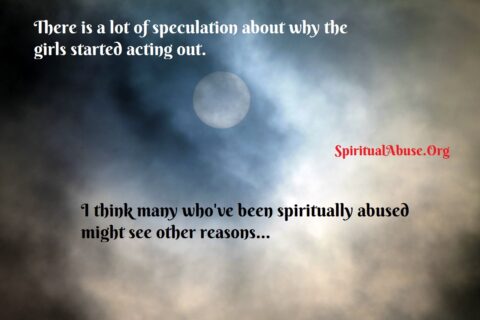On my way to Missouri last weekend, I heard Hank Hanegraff on the radio responding to a question about suicide:
“First of all, you can’t say that suicide is the unforgivable sin, because no single act is an unforgivable sin. The unforgivable sin is a continual ongoing rejection of forgiveness. And those who refuse forgiveness through Christ will spend eternity separated from his love and grace. Those who sincerely desire forgiveness can be absolutely certain that God will never spurn them…”
I’ve heard that anyone who killed themselves would die with unrepented sin in their lives and go straight to hell. I was taught that blasphemy was the unforgivable sin and was taught that even joking about tongues (kidding around and imitating someone, for instance) might be blasphemy and shouldn’t be risked, because no one knows where God might draw the line and strike down.
Both these concepts show a judgmental, angry God, not an Abba Father. So Hank’s statement really stood out to me, like this:
“First of all, you can’t say that suicide is the unforgivable sin, because no single act is an unforgivable sin. The unforgivable sin is a continual ongoing rejection of forgiveness. And those who refuse forgiveness through Christ will spend eternity separated from his love and grace. Those who sincerely desire forgiveness can be absolutely certain that God will never spurn them...”
This helped me a lot. I don’t have to be afraid that I might make a mistake and then die in a car wreck before I could ask forgiveness of whatever it was and go to hell. I don’t have to be scared that I might accidentally blaspheme the Holy Ghost by shouting “in the flesh” or uttering some syllables in imitation of tongues when it was really just me. I don’t have to run around all day muttering “Forgive me, oh, God, I’m sorry. Forgive me!” in order to insure salvation. Wow, what a relief.
Then I got home, and someone gave me some books. One of the books was The Shack. I’ve been avoiding that one. It was preached against at my former church. Really, really bad book, right up there with Christianity without the Cross. Duh. I should have known by that alone that I should definitely read it! There are some good points in it… including a discussion about how God is often viewed as judgmental and wrathful, but Jesus is looked at as Savior. That people pray to God when they want revenge or expect anger and judgment, and pray to Jesus when they want forgiveness. And as I read that I realized how few times I heard Jesus preached at my former church, unless it was as an image of the ultimate sacrifice and the wrath and judgment of God! Jesus is God in flesh, and Pentecostals are supposed to be Oneness, but the ones I knew still focused on an all-powerful God ready to squash us at any moment, rather than on the Savior who had made a way for us, and done what we couldn’t do!
Anyway, I’m still working through this thing called grace. That was a whole lot to think on in just one week. Grace is kind of going to be a quantum leap for me, since I never was really taught about grace as a child or an adult. But I’m beginning to really like the sound of it!









